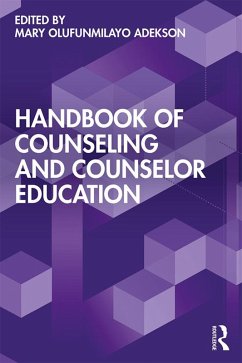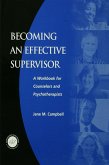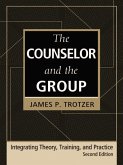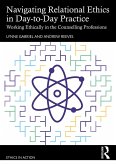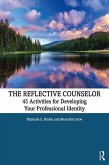Handbook of Counseling and Counselor Education (eBook, ePUB)
Redaktion: Adekson, Mary Olufunmilayo
103,95 €
103,95 €
inkl. MwSt.
Sofort per Download lieferbar

52 °P sammeln
103,95 €
Als Download kaufen

103,95 €
inkl. MwSt.
Sofort per Download lieferbar

52 °P sammeln
Jetzt verschenken
Alle Infos zum eBook verschenken
103,95 €
inkl. MwSt.
Sofort per Download lieferbar
Alle Infos zum eBook verschenken

52 °P sammeln
Handbook of Counseling and Counselor Education (eBook, ePUB)
Redaktion: Adekson, Mary Olufunmilayo
- Format: ePub
- Merkliste
- Auf die Merkliste
- Bewerten Bewerten
- Teilen
- Produkt teilen
- Produkterinnerung
- Produkterinnerung

Bitte loggen Sie sich zunächst in Ihr Kundenkonto ein oder registrieren Sie sich bei
bücher.de, um das eBook-Abo tolino select nutzen zu können.
Hier können Sie sich einloggen
Hier können Sie sich einloggen
Sie sind bereits eingeloggt. Klicken Sie auf 2. tolino select Abo, um fortzufahren.

Bitte loggen Sie sich zunächst in Ihr Kundenkonto ein oder registrieren Sie sich bei bücher.de, um das eBook-Abo tolino select nutzen zu können.
The Handbook of Counseling and Counselor Education provide counselors in training, educators, and professional counselors with information on the major contemporary issues impacting the field.
- Geräte: eReader
- ohne Kopierschutz
- eBook Hilfe
- Größe: 3.41MB
Andere Kunden interessierten sich auch für
![Becoming an Effective Supervisor (eBook, ePUB) Becoming an Effective Supervisor (eBook, ePUB)]() Jane CampbellBecoming an Effective Supervisor (eBook, ePUB)46,95 €
Jane CampbellBecoming an Effective Supervisor (eBook, ePUB)46,95 €![The Professional Counselor (eBook, ePUB) The Professional Counselor (eBook, ePUB)]() Shannon HodgesThe Professional Counselor (eBook, ePUB)33,95 €
Shannon HodgesThe Professional Counselor (eBook, ePUB)33,95 €![Preparing the Educator in Counselor Education (eBook, ePUB) Preparing the Educator in Counselor Education (eBook, ePUB)]() Preparing the Educator in Counselor Education (eBook, ePUB)36,95 €
Preparing the Educator in Counselor Education (eBook, ePUB)36,95 €![The Counselor and the Group, fourth edition (eBook, ePUB) The Counselor and the Group, fourth edition (eBook, ePUB)]() James P. TrotzerThe Counselor and the Group, fourth edition (eBook, ePUB)54,95 €
James P. TrotzerThe Counselor and the Group, fourth edition (eBook, ePUB)54,95 €![Metaphors in Counselor Education and Supervision (eBook, ePUB) Metaphors in Counselor Education and Supervision (eBook, ePUB)]() Metaphors in Counselor Education and Supervision (eBook, ePUB)33,95 €
Metaphors in Counselor Education and Supervision (eBook, ePUB)33,95 €![Navigating Relational Ethics in Day-to-Day Practice (eBook, ePUB) Navigating Relational Ethics in Day-to-Day Practice (eBook, ePUB)]() Lynne GabrielNavigating Relational Ethics in Day-to-Day Practice (eBook, ePUB)26,95 €
Lynne GabrielNavigating Relational Ethics in Day-to-Day Practice (eBook, ePUB)26,95 €![The Reflective Counselor (eBook, ePUB) The Reflective Counselor (eBook, ePUB)]() Michelle S. HinkleThe Reflective Counselor (eBook, ePUB)34,95 €
Michelle S. HinkleThe Reflective Counselor (eBook, ePUB)34,95 €-
-
-
The Handbook of Counseling and Counselor Education provide counselors in training, educators, and professional counselors with information on the major contemporary issues impacting the field.
Dieser Download kann aus rechtlichen Gründen nur mit Rechnungsadresse in A, B, BG, CY, CZ, D, DK, EW, E, FIN, F, GR, HR, H, IRL, I, LT, L, LR, M, NL, PL, P, R, S, SLO, SK ausgeliefert werden.
Produktdetails
- Produktdetails
- Verlag: Taylor & Francis eBooks
- Seitenzahl: 540
- Erscheinungstermin: 23. Juli 2019
- Englisch
- ISBN-13: 9781351164184
- Artikelnr.: 57160859
- Verlag: Taylor & Francis eBooks
- Seitenzahl: 540
- Erscheinungstermin: 23. Juli 2019
- Englisch
- ISBN-13: 9781351164184
- Artikelnr.: 57160859
- Herstellerkennzeichnung Die Herstellerinformationen sind derzeit nicht verfügbar.
Mary Olufunmilayo Adekson, PhD, is a retired counselor educator. Mary has authored two books, a book chapter, and articles related to traditional healing and counseling. She is the CEO of Faith Diversity Consulting.
Introduction. Overview of Pertinent Issues Discussed in the Handbook of
Counseling and Counselor Education Section I. Professional Orientation and
Ethical Practices 1. Professional Practice: Gaining Clinical Expertise for
Practicum, Internship, and Post-Graduation Experiences 2. Finding Your
Professional Niche: Getting Involved in Professional Organizations and
Honor Societies 3. Obtaining a License to Practice Counseling 4. Specialty
Certifications in Professional Counseling 5. Developing and Practicing
Aspirational Ethics: A Paradigm Shift 6. Technology in Counselor Education:
Implications for Teaching, Supervision, and Clinical Counseling 7.
Contemporary Employment in Counseling and Future Trends 8. Professional and
Career Development for Counselor Education: Strategies for an Effective Job
Search Section II: Social and Cultural Diversity 9. Multicultural
Awareness, Knowledge, and Skills 10. Preparing Counselors Across Cultures
11. Religion, Spirituality, and Counseling Psychology 12. Issues Related to
Advocacy and Social Justice in Counseling and Counselor Education Section
III: Human Growth and Development 13. Basic Concepts of Neuroscience in
Counseling and Counselor Education 14. Early Development and Trauma Within
the Culture of Children: Teaching Counselors in Training to Understand the
Effects of Trauma and its Misdiagnosis 15. The Importance of Incorporating
Knowledge of Trauma Remediation Modalities into Counselor Education and
Practice 16. The Counselor's Role in Fostering Emotional and Cognitive
Development Across the Lifespan Section IV: Career Development 17. Career
Counseling Decision Making Protocols 18. Career Theories in Counseling
Section V: Assessment and Testing in Counseling 19. Assessment and Testing:
Perspectives for Counseling and Counselor Education Section VI: Risk
Prevention in Counseling 20. Risk Management and Resilience in Counseling
21. A Most Unnecessary End: Identifying and Preventing Suicidal Behavior
Section VII: Group Work 22. Group Counseling Strategies, Dynamics, Theories
and Practices 23. Culturally Competent Group Leadership: Research and
Practice Section VIII: Research and Program Evaluation 24. Writing and
Presenting Research 25. Literature Review in Counseling Research 26.
Applying for and Securing Grants 27. Publishing Research Section IX:
Supervision in Counseling and Counselor Education 28. Supervision as a
Counseling Toolkit Section X: Counseling and Helping Relationships 29.
Highlights of Major Theories of Counseling 30. Developing a Personal
Theoretical Orientation of Counseling 31. Theoretical Notions in
Contemporary Counseling Practice
Counseling and Counselor Education Section I. Professional Orientation and
Ethical Practices 1. Professional Practice: Gaining Clinical Expertise for
Practicum, Internship, and Post-Graduation Experiences 2. Finding Your
Professional Niche: Getting Involved in Professional Organizations and
Honor Societies 3. Obtaining a License to Practice Counseling 4. Specialty
Certifications in Professional Counseling 5. Developing and Practicing
Aspirational Ethics: A Paradigm Shift 6. Technology in Counselor Education:
Implications for Teaching, Supervision, and Clinical Counseling 7.
Contemporary Employment in Counseling and Future Trends 8. Professional and
Career Development for Counselor Education: Strategies for an Effective Job
Search Section II: Social and Cultural Diversity 9. Multicultural
Awareness, Knowledge, and Skills 10. Preparing Counselors Across Cultures
11. Religion, Spirituality, and Counseling Psychology 12. Issues Related to
Advocacy and Social Justice in Counseling and Counselor Education Section
III: Human Growth and Development 13. Basic Concepts of Neuroscience in
Counseling and Counselor Education 14. Early Development and Trauma Within
the Culture of Children: Teaching Counselors in Training to Understand the
Effects of Trauma and its Misdiagnosis 15. The Importance of Incorporating
Knowledge of Trauma Remediation Modalities into Counselor Education and
Practice 16. The Counselor's Role in Fostering Emotional and Cognitive
Development Across the Lifespan Section IV: Career Development 17. Career
Counseling Decision Making Protocols 18. Career Theories in Counseling
Section V: Assessment and Testing in Counseling 19. Assessment and Testing:
Perspectives for Counseling and Counselor Education Section VI: Risk
Prevention in Counseling 20. Risk Management and Resilience in Counseling
21. A Most Unnecessary End: Identifying and Preventing Suicidal Behavior
Section VII: Group Work 22. Group Counseling Strategies, Dynamics, Theories
and Practices 23. Culturally Competent Group Leadership: Research and
Practice Section VIII: Research and Program Evaluation 24. Writing and
Presenting Research 25. Literature Review in Counseling Research 26.
Applying for and Securing Grants 27. Publishing Research Section IX:
Supervision in Counseling and Counselor Education 28. Supervision as a
Counseling Toolkit Section X: Counseling and Helping Relationships 29.
Highlights of Major Theories of Counseling 30. Developing a Personal
Theoretical Orientation of Counseling 31. Theoretical Notions in
Contemporary Counseling Practice
Introduction. Overview of Pertinent Issues Discussed in the Handbook of
Counseling and Counselor Education Section I. Professional Orientation and
Ethical Practices 1. Professional Practice: Gaining Clinical Expertise for
Practicum, Internship, and Post-Graduation Experiences 2. Finding Your
Professional Niche: Getting Involved in Professional Organizations and
Honor Societies 3. Obtaining a License to Practice Counseling 4. Specialty
Certifications in Professional Counseling 5. Developing and Practicing
Aspirational Ethics: A Paradigm Shift 6. Technology in Counselor Education:
Implications for Teaching, Supervision, and Clinical Counseling 7.
Contemporary Employment in Counseling and Future Trends 8. Professional and
Career Development for Counselor Education: Strategies for an Effective Job
Search Section II: Social and Cultural Diversity 9. Multicultural
Awareness, Knowledge, and Skills 10. Preparing Counselors Across Cultures
11. Religion, Spirituality, and Counseling Psychology 12. Issues Related to
Advocacy and Social Justice in Counseling and Counselor Education Section
III: Human Growth and Development 13. Basic Concepts of Neuroscience in
Counseling and Counselor Education 14. Early Development and Trauma Within
the Culture of Children: Teaching Counselors in Training to Understand the
Effects of Trauma and its Misdiagnosis 15. The Importance of Incorporating
Knowledge of Trauma Remediation Modalities into Counselor Education and
Practice 16. The Counselor's Role in Fostering Emotional and Cognitive
Development Across the Lifespan Section IV: Career Development 17. Career
Counseling Decision Making Protocols 18. Career Theories in Counseling
Section V: Assessment and Testing in Counseling 19. Assessment and Testing:
Perspectives for Counseling and Counselor Education Section VI: Risk
Prevention in Counseling 20. Risk Management and Resilience in Counseling
21. A Most Unnecessary End: Identifying and Preventing Suicidal Behavior
Section VII: Group Work 22. Group Counseling Strategies, Dynamics, Theories
and Practices 23. Culturally Competent Group Leadership: Research and
Practice Section VIII: Research and Program Evaluation 24. Writing and
Presenting Research 25. Literature Review in Counseling Research 26.
Applying for and Securing Grants 27. Publishing Research Section IX:
Supervision in Counseling and Counselor Education 28. Supervision as a
Counseling Toolkit Section X: Counseling and Helping Relationships 29.
Highlights of Major Theories of Counseling 30. Developing a Personal
Theoretical Orientation of Counseling 31. Theoretical Notions in
Contemporary Counseling Practice
Counseling and Counselor Education Section I. Professional Orientation and
Ethical Practices 1. Professional Practice: Gaining Clinical Expertise for
Practicum, Internship, and Post-Graduation Experiences 2. Finding Your
Professional Niche: Getting Involved in Professional Organizations and
Honor Societies 3. Obtaining a License to Practice Counseling 4. Specialty
Certifications in Professional Counseling 5. Developing and Practicing
Aspirational Ethics: A Paradigm Shift 6. Technology in Counselor Education:
Implications for Teaching, Supervision, and Clinical Counseling 7.
Contemporary Employment in Counseling and Future Trends 8. Professional and
Career Development for Counselor Education: Strategies for an Effective Job
Search Section II: Social and Cultural Diversity 9. Multicultural
Awareness, Knowledge, and Skills 10. Preparing Counselors Across Cultures
11. Religion, Spirituality, and Counseling Psychology 12. Issues Related to
Advocacy and Social Justice in Counseling and Counselor Education Section
III: Human Growth and Development 13. Basic Concepts of Neuroscience in
Counseling and Counselor Education 14. Early Development and Trauma Within
the Culture of Children: Teaching Counselors in Training to Understand the
Effects of Trauma and its Misdiagnosis 15. The Importance of Incorporating
Knowledge of Trauma Remediation Modalities into Counselor Education and
Practice 16. The Counselor's Role in Fostering Emotional and Cognitive
Development Across the Lifespan Section IV: Career Development 17. Career
Counseling Decision Making Protocols 18. Career Theories in Counseling
Section V: Assessment and Testing in Counseling 19. Assessment and Testing:
Perspectives for Counseling and Counselor Education Section VI: Risk
Prevention in Counseling 20. Risk Management and Resilience in Counseling
21. A Most Unnecessary End: Identifying and Preventing Suicidal Behavior
Section VII: Group Work 22. Group Counseling Strategies, Dynamics, Theories
and Practices 23. Culturally Competent Group Leadership: Research and
Practice Section VIII: Research and Program Evaluation 24. Writing and
Presenting Research 25. Literature Review in Counseling Research 26.
Applying for and Securing Grants 27. Publishing Research Section IX:
Supervision in Counseling and Counselor Education 28. Supervision as a
Counseling Toolkit Section X: Counseling and Helping Relationships 29.
Highlights of Major Theories of Counseling 30. Developing a Personal
Theoretical Orientation of Counseling 31. Theoretical Notions in
Contemporary Counseling Practice
